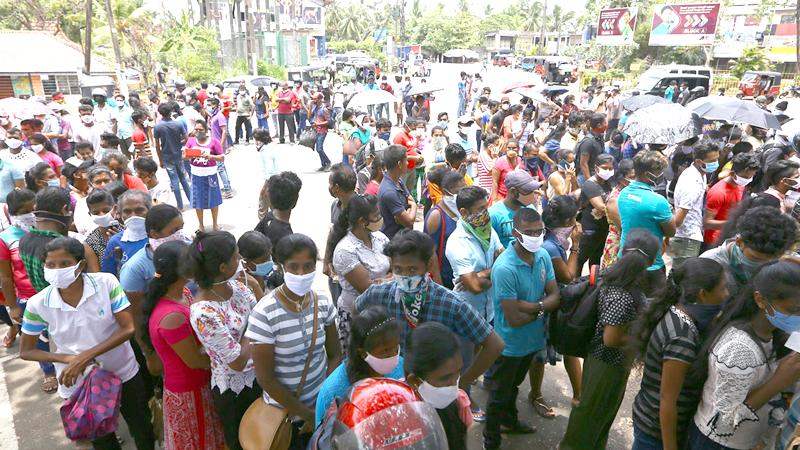
It had been over two months since Dilrukshi Sandamali, a Katunayake Free Trade Zone (FTZ) manpower worker last went to work. When the 33-year-old mother of three reported to work on April 30 she was informed she had been laid off because she failed to report to work on April 27, the day the factory re-opened after the curfew.
“I told them that I did not get a letter stating that work had resumed on April 27,” Dilruskshi said.
Because Dilrukshi was relatively new at the factory she had been put on the manpower cadre. This meant she would only get work and paid only if the factory does not have sufficient employees to meet the work demand. Three months after she joined, the country went into lockdown and curfew was imposed due to the Covid-19 pandemic.
“My husband works as a mason. He did not have work for over two months now. This is the only income we had. We did not complain about it because some work is better than nothing,” she said.
Dilrukshi was relatively luckier than most of the FTZ workers. When the curfew was imposed most struggled to get back home.
Forty-year-old Shiromi Priyangika, a mother of two from Embilipitiya is residing in Katunayake because of its close proximity to her workplace in the Kandana FTZ. Today she is finding it hard to get by after loss of work. Though she applied for the Rs. 5,000 relief given by the government she did not receive it. Neither did Dilrukshi.
“It was worse for my friend from Polonnaruwa. She had to stay in the boarding house for weeks before she could return home last week,” Shiromi said. Now her friend is in a quarantine center. Work at the factory has already commenced.
As Covid 19 affected the FTZs which mainly focus on exports, it is the manpower employees that suffered the most.
Transport
In March end Minister of Industrial Export and Investment Promotion and Minister of Tourism and Civil Aviation Prasanna Ranatunga announced the closure of all FTZs. Though transport was promised for the workers to return home it backfired when people who were not working at the zones used the transportation along with some workers who were lucky enough to get transport. Many as Shiromi’s friend, were trapped in their boarding houses. Later with the aid of the Army, the stranded workers were taken to their home towns.
The loss of work meant a majority had to return to their home towns empty-handed. As Sri Lanka’s export earnings dropped almost by 64 percent in April, the apparel industry too suffered as its earnings dipped by around 82 percent. According to FTZ employers, they are unable to sustain the previous workforce in these circumstances.
However, media spokesperson for BOI Jagath de Silva said many workers have returned to work since the factories recommenced work.
But according to Chamila Thushari of the Dabindu Collective, an organisation for female workers in the FTZs workers at the zones had to face a plethora of problems during the pandemic. According to Chamila, even with the loss of work many FTZ workers and manpower employees opted to not to return to their villages. “There is no work in their villages so they opted to stay back hoping they will be able to find some work,” she said. Stuck in their boardings during the lockdown Chamila said many are in dire straits now.
“Those who have been working for less than six months before curfew have lost their jobs,” she said adding that even the other staff is facing the brunt. “Some are trying to use manpower workers by paying them Rs. 1,000 - Rs. 1,500 to work as machine operators” she said. According to her machine operators who have been working for a short period of time have not been called to work while some are only being called to work for a few days a week.
Many have also not received their salaries for the past two months. “The agreed minimum of Rs 14, 500 has not been paid by some employers” Chamila said adding that some companies have paid only Rs. 5,000 to their staff.
“How can they live on this?” she asked. Noting that the garment industry is a profitable business Chamila questioned if the companies can go bankrupt within two months as they claim to be. “These women worked hard to bring revenue year after year so treating them this way is shameful,” she said.
Chamila said many have been going without food. “When we opened our office last week many walked in asking for food to feed their children,” she said.
“There are many stories of tears in these boardings” she added. Dabindu Collective has been trying to support woman by providing dry rations and also gathering information on those who are struggling after losing their jobs in a bid to help them.
With consecutive governments promoting manpower cadre increasing the informal workers’ sector, she said Covid 19 has revealed now its fallacies and dangers.
Fate of the workers of the garment sector has been brought to the attention of the government and the Covid 19 Task Force appointed by the President. Thus, workers are hopeful there will be some relief to ease the burden.

